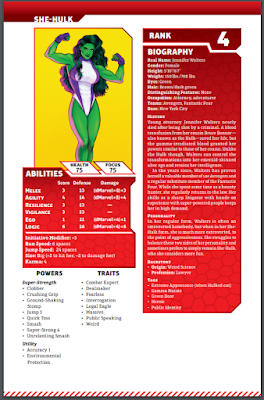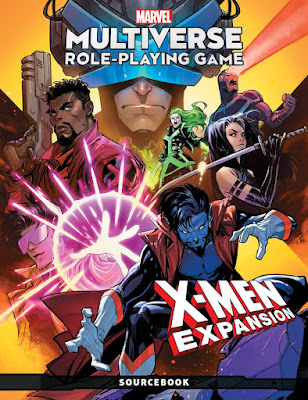I posted about it last year, what I thought would be the first of several, and then honestly I just ran out of gas. The more I looked at it the more it looked like "work" instead of fun and that's a bad sign when it comes to RPGs. The different but not -that- different dice mechanics, the weird mix of class and level elements into a superhero game in a modern release, and the unnecessarily complicated bunch of modifiers and details just made it look un-fun. Just basic elements like "where is the skill system" ... well some of what you might consider skills are mixed into the stats ... ok fine ... but some are also in the "traits" system and some are mixed into powers. I looked at it, asked myself when was I ever going to run it, and decided the answer was "not anytime soon" so I put it on the shelf and mostly forgot about it while house-hunting and prepping for the move.
This week we have a new announcement that the core rulebook is releasing this year with a big adventure and an X-Men supplement is coming next year. Alright, time to take another look - Nope! Still do not like it! Then I went and downloaded the latest rules revisions and, well, I have to say it looks a lot better than the first version. They got rid of archetypes! Excellent! They cut the 25 ranks (that looked a whole lot like M&Ms Power Levels) down to 6:
▶ Rank 1—Rookie: A regular person or a brand-new hero.
▶ Rank 2—Protector: A character who protects a neighborhood, such as Daredevil or Iron Fist.
▶ Rank 3—Champion: A hero who protects a major city, such as Spider-Man.
▶ Rank 4—Legend: A hero who protects an entire nation, such as Captain America.
▶ Rank 5—Mythic: A hero who walks among the gods, such as Thor.
▶ Rank 6—Cosmic: A hero who can influence the course of a galaxy, such as Captain Marvel.
That seems like a fairly reasonable breakdown of power levels for a superhero game. It took them an extra update but they also got rid of Rank as a modifier - it appears to be entirely a non-mechanical thing now outside of determining how many power sets and individual powers a character has.
Also they've cut way down on the number of modifiers and defenses and just the math and numbers in general. This is good as I don't think we should have do a lot of "x25" calculations in the course of the game - well, outside of knockback distance from a Hulk-punch anyway.
They also split Traits into Traits (mechanical effect) and Tags (non-mechanical RP-type stuff like "secret identity") Traits come into play per the rules for each one while Tags are something you can invoke for Karma points. Totally sensible. There's been some shuffling of things between those two and Powers and it mostly makes sense.
The M in Marvel is now "Melee" instead of "Might" which explains my double take when I saw Cap had a 6 and She-Hulk had a 3 before I looked more closely. The updated character sheets are here by the way.
So there has definitely been positive change happening with the game. Of course, it ain't perfect - from the latest update (November 2022):
Brawling
This is a new power.
The character is hard to shoot.
Power Sets: None
Prerequisites: None
Action: None
Duration: Permanent
Effect: The character can use their Melee defense score against Agility attacks too.
Does that sound like "brawling"? If I said "my character has Brawling" is that what springs to mind? He's harder to shoot? There are several things like this where something just seems off in some way. The "d616" roll is now identified as "dMarvel" - I'm not kidding. I can't tell if the update was rushed or if that's a placeholder or if they just have a very different view of the universe than I do.
 |
| I'd say that's roughly a Villains & Vigilantes level of detail on the character sheet - not too bad. |
I think the power flowcharts remain too which are not my favorite things. Still, it looks more interesting than the first draft. This is from one of the earlier updates but may be my favorite power idea out of the whole thing:
New Rule: Tech Reliance
▶ Original rule page 59
▶ The character relies on technology for their powers. When they take damage that would render them unconscious, they can instead lose one of their technology related power sets of their choice. (For this purpose only, all of a character’s utility powers are considered a single set.)
If the attack that would render the character unconscious is a fantastic success, the attacker gets to choose the power set to be lost instead.
Assuming the character has access to parts and tools, lost power sets can be repaired after a battle by means of a challenging Logic check.
This is such a great example of a power or trait meshing with the genre - I have to figure out how to incorporate it into some other games now.
Despite this particular bit of awesome and the improvements noted above I keep coming back to one inescapable thought: Given the opportunity to run a superhero RPG would I choose this as the ruleset I want to use? The answer is pretty much always no. That's the problem. Even just looking at Marvel RPGs, well ...
- TSR's MSH (FASERIP) had a lot of innovative mechanics for the time and it still holds up pretty well. It's easy to understand, easy to play, and it just works the vast majority of the time. It takes a broad approach and sticks to it.
- TSR's next effort, SAGA, is not one I have played but the people who like it *really* like it and will tell you all about it given half a chance. It clearly stuck with people and that tells me it had something special.
- The Marvel Universe RPG - well this is the outlier. It's the one with the stones. Never played it, never heard much good about it, don't really care about checking it out.
- MWP's Marvel Heroic Roleplaying - here is another loose or narrative approach that can take a minute to grasp coming from other systems but it works really well and people who like it *really* like it - count me among them. It's not a Champions replacement it's a different kind of game entirely.









